The benefits of DIY waste-free ricotta
How to make it, how to serve it (think camp fire rissotto, creamy polentas, whipped ricotta dips)…AND so many uses for the whey, so you’ll never waste a drop.
How to Make Ricotta at Home & Epic Ways to use it to it’s full potential.
Making ricotta at home is surprisingly easy and yes, it’s well worth doing.
Store bought ricotta often contains stabilizers and lacks the creamy, delicate texture of fresh, homemade cheese. With just a few basic ingredients, you can create a rich, fluffy ricotta in under an hour, perfect for both sweet and savoury dishes. Plus you have the b- product “whey” with all of its uses and benefits.
So, before we kick off let’s talk about the lovely stuff…
What milk to use?
When it comes to making ricotta at home, the quality of your milk makes all the difference. The best choice is full-fat whole milk, ideally organic and non-homogenized if you can get it. The higher the fat content, the richer and creamier your ricotta will be, which is exactly what you want for that light fluffy texture.
If you’re using raw milk, even better. But if not, a good quality pasteurized whole milk works just fine. Just avoid ultra-pasteurized (UHT) milk because the extreme heat processing messes with the proteins making it nearly impossible to get a good curd. You’ll end up with a thin grainy mess instead of those beautiful soft curds you’re after.
For extra depth of flavour you can even mix in a splash of cream which gives the ricotta a silkier texture. Goat’s milk also works well if you want a slightly tangy twist.
Bottom line:
GO for fresh full-fat and as natural as possible.
The better the milk, the better the ricotta, and once you’ve tasted homemade you’ll never go back to the store bought stuff.
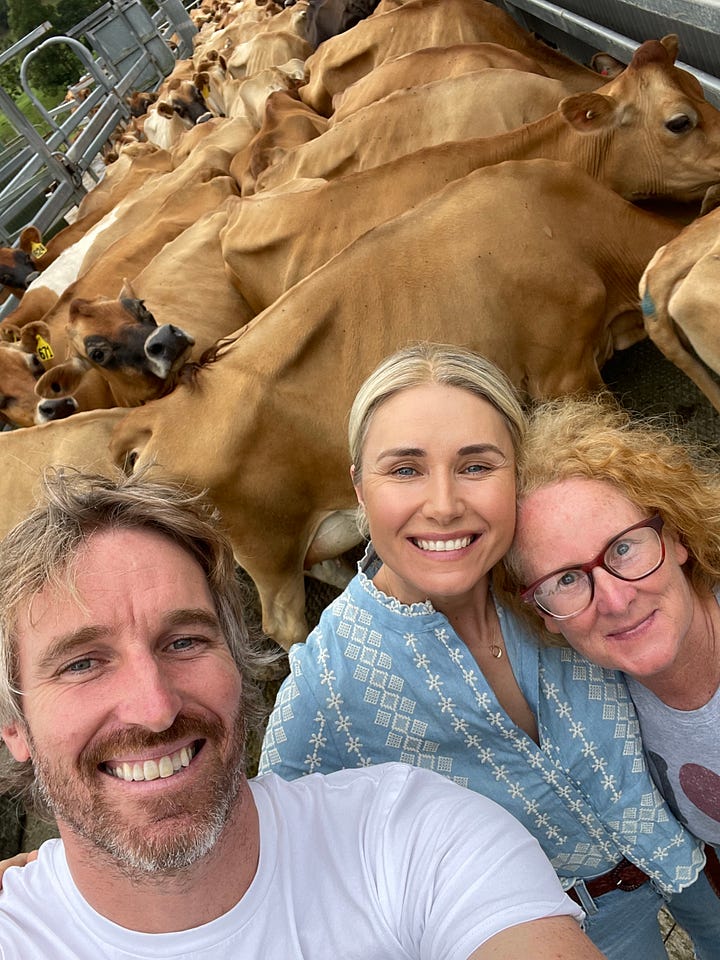
My absolute favourite milk to use is from Deb Allard. Deb is a legit cheese maker in the Northern Rivers. She runs Cheeses Love You with her husband Jim in Burringbar.
Deb and Jim produce an impressive cheese range including cottage cheese, ricotta, halloumi, feta, brie, camembert, blue and romano, as well as other dairy products like kefir, cultured butter and yoghurt, all made with milk from their Jersey cows. Their Cheeses can be found at local farmers markets, including Mullumbimby and New Brighton farmers market.
How to Make Ricotta
The recipe I use, that always produces a fresh, mildly sweet cheese, that has a truckloads of uses.
How to make Fresh Ricotta
Recipe
600ml full fat milk
2 - 3 tbsp of lime, lemon juice or vinegar
A pinch of salt.
Method
Heat the milk to just below boiling (around 85°C or 185°F), then stir in the acid. The milk will curdle, separating into curds and whey.
Let it sit for about 10 minutes, then carefully spoon out or strain through a cheesecloth for 10–20 minutes, depending on how creamy or firm you want it.
Now, flavour the curd with whatever s your fancy, and store in the fridge until you’re ready for a snack.
Why Make Your Own Ricotta?
Homemade ricotta has a fresher, purer taste without preservatives or additives. It’s also more affordable than high-quality store-bought versions. The best part is you can put your own twist it by adding herbs, spices, honey or flavoured oils.
Flavouring Fresh Ricotta
Give these a little crack.
• Fresh herbs like basil, chives, or thyme for a savoury spread
• Roasted garlic or caramelized onions for depth of flavor
• Preserved lemon or chili flakes for a bright or spicy kick
• Honey, maple, cinnamon, or vanilla for a sweet option
• Smoked salt or even truffle oil for an old school posh version!
Campfire Corn & whey Risotto with Ricotta & pancetta
Risotto, is a fantastic way to enjoy ricotta. Here I use the whey to cook the rice and finish the dish with fresh ricotta, loads of herbs, lemon and olive oil. Obviously, the camp is optional, it’s certainly a lot more romantic! BTW, the pan is a Solidteknics.
Keep reading with a 7-day free trial
Subscribe to How to be a better cook to keep reading this post and get 7 days of free access to the full post archives.




